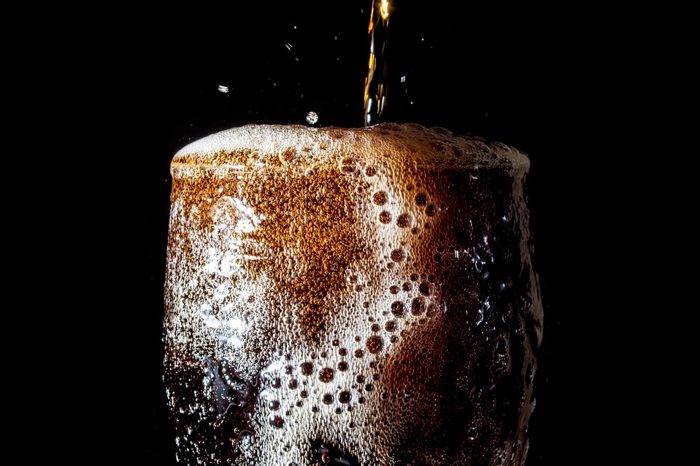This Is What Happens One Hour After Drinking a Can of Soda
Updated: Mar. 16, 2022

On a hot day, alongside a burger, or as a replacement for coffee: We love our soda, but that soda sure doesn't love us. Here's why.
An ice-cold cola sure hits the spot sometimes, but that blast of sugar does a number on your body. Downing a can of soda can send your body into a frenzy—so the next time you need to rehydrate, you might want to stick with water or seltzer.
What happens in the body when you drink soda
Crack, fizz, gulp: Within the first 10 to 15 minutes of chugging that cola, your intestines mainline that sugar to your blood, spiking your blood sugar levels. That’s a ton of quick, fizzy energy, and to manage the onslaught, multiple organs in your body kick into overdrive so you can process that sugar. Soda companies don’t tell you everything either; these are the secrets Coca-Cola doesn’t want you to know.
Your pancreas chugs out insulin to help transport the sugar (which is a carbohydrate) to your muscles for energy. But that soda contains way more sugar than your muscles need. “When an individual drinks a 20-ounce soda, they are getting an entire meal’s carbohydrate load through liquid,” explains Meltem Zeytinoglu, MD, an endocrinologist and assistant professor of medicine at the University of Chicago Medicine, in Chicago, IL. “In most cases, this soda is consumed in addition to a meal, so the additional carbohydrates will need to be processed. This extra sugar, instead of being stored in muscle tissue, gets converted to fat in the liver.” According to a study in the Journal of Hepatology, regular soda intake is linked to a condition known as fatty liver disease. Sugar in soda might damage your brain, too.
Your kidney also comes into play by helping dump excess sugar through your urine. That means your body loses water, which, along with the diuretic effect of the caffeine in the soda, increases your risk of dehydration. The sugar and caffeine in soda is “quite the unhealthy combination,” says Dr. Zeytinoglu. Make sure you know how diet soda affects intermittent fasting too.
What happens in your brain when you drink soda
Then there’s the issue of one soda never really being enough: A study in the British Journal of Sports Medicine suggested that sugar and drugs of abuse have a lot in common when it comes to effects on brain chemistry and behavior.
The good news is you don’t have to banish sodas completely. “The most important thing to remember is that portion control matters,” says Cordialis Msora-Kasago, RDN, a spokesperson for the Academy of Nutrition and Dietetics in Los Angeles, CA. “An occasional soda is not going to have a significant impact on your health. It’s when it becomes a regular habit that [it’s] a problem. Look for other non-caloric beverages you enjoy, like iced tea, water, and infused waters.” And here are some more reasons to cut back on all soda (including diet).



















